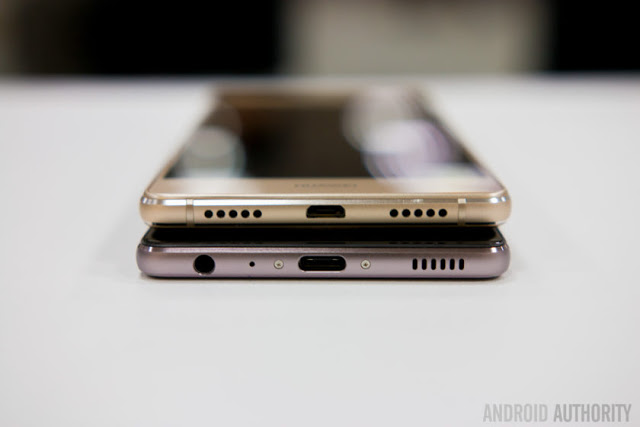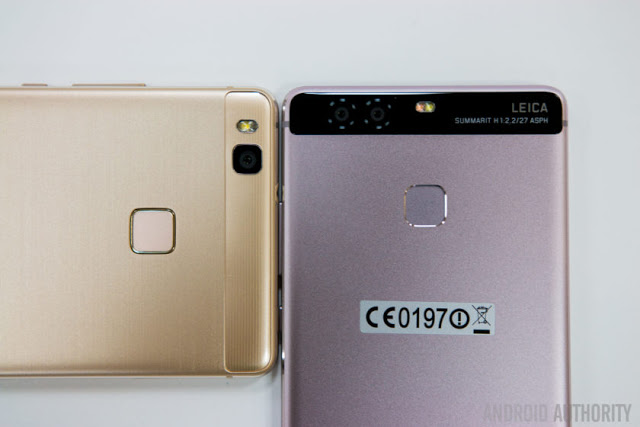A popular trend followed by almost every Android OEM is the release of different versions of their high-end smartphones, mostly of the Plus and Lite varieties, that usually feature a difference in sizes and specifications, while keeping the general design language intact, in an attempt to cash in on the name recognition of the original flagship.
Huawei is no stranger to this, and continues it with the recent release of the Huawei P9 Lite, that followed the launch of the P9 and P9 Plus. The P9 Lite is obviously the most affordable of the bunch, but is there a significant difference between it and its flagship counterpart? We find out, in this quick look at the Huawei P9 Lite vs Huawei P9!
Design
While the Huawei P9 Lite and P9 feature the same design language, there are subtle changes made across design elements that bring the affordable nature of the former to the forefront. For starters, while the P9 features a full unibody construction, the P9 Lite comes with a metal frame that is coupled with a polycarbonate backing. The move to plastic isn’t a bad choice here, and isn’t particularly noticeable at first glance either, with a faux brushed metal finish to be found.
The other big difference between the two phones can be seen on the back. The P9 comes with a black bar up top that houses the dual camera setup, reminiscent of the also Huawei-manufactured Nexus 6P. On the other hand, the P9 Lite also comes with a thin strip at the top, which retains the color of the body though, and houses a single camera unit. Both smartphones have a fingerprint sensor on the back as well.
The power button and volume rocker can be found on the right side on both smartphones. However, the headphone jack of the P9 is placed at the bottom, but can be found up top with the P9 Lite. With the P9, there is a single speaker unit at the bottom next to the USB Type C port, while the P9 Lite comes with a microUSB port instead, flanked by two grills. That said, despite the appearance of two speaker grills, only one houses a single speaker unit.
While both smartphones feature the same 5.2-inch display, the Huawei P9 Lite is a touch taller, wider, and thicker than its premium sibling. However, both are still relatively compact, and offer the same, good handling experience, helped along with the slight curves along the sides of the back, that help both phones nestle nicely in the palm of your hand. The switch to plastic actually helps the P9 Lite when it comes the handling experience, with the metal body of the P9 making it slightly slippery.
Both the Huawei P9 and P9 Lite and great looking smartphones, and while there are some differences between the two to help make the latter more affordable, they are very subtle, and certainly not noticeable right off the bat. You certainly won’t have anything to complain about when it comes to the design with either phone.
Display->>>
Both smartphones come with 5.2-inch IPS LCD display with a Full HD resolution, resulting in pixel densities of 424 ppi. The display of the P9 is capable of a brightness of 500 nits, while with the P9 Lite, that is 450 nits. The P9 is obviously brighter, but outdoor visibility isn’t a concern with either smartphone. You get vibrant, saturated colors with these displays, and the viewing experience will be enjoyable not matter which device you pick. One point to keep in mind is that while the P9 comes with Corning Gorilla Glass 4 protection, the P9 Lite features regular glass, so a screen protector of some sort may be a good idea.
Performance and hardware->>
The Huawei P9 comes with an octa-core HiSilicon Kirin 955 processor, clocked at 2.5 GHz, and backed by the Mali-T880MP4 GPU and 3 GB or 4 GB of RAM, depending on the storage configuration and market. On the other hand, the P9 Lite comes with the mid-range octa-core HiSilicon Kirin 650 processor, clocked at 2 GHz, and backed the Mali-T880MP2 GPU and 2 GB or 3 GB of RAM, which is market dependent.
The P9 features a beefed up version of the processing package that powered the flagship Mate 8, and as expected, high-end performance is what you get here. The device, handles everything from everyday tasks to heavy gaming, with ease, and things remain smooth and snappy throughout. The performance of the P9 Lite will understandably not match up to its namesake, but from what we’ve seen so far, should be pretty good as well.
The P9 is available in 32 GB and 64 GB versions, which also dictates whether you get 3 GB or 4 GB of RAM. However, in certain markets, only the 32 GB and 3 GB iteration of the device will be available. On the other hand, only 16 GB of built-in storage is available with the P9 Lite. Both smartphones come with expandable storage via microSD card up to an additional 128 GB. That said, these utilizes the second SIM slot, so users will have to make the choice between expandable storage and dual SIM capabilities.
Both smartphones come with fingerprint scanners on the back, ideally placed to be within comfortable reach of your index finger. Both scanners are equally fast and accurate, and apart from unlocking your device, these sensors come with a few other capabilities as well. You can swipe left or right to move between images in a gallery, use it as a shutter button to take photos and selfies, and as a button to answer or end calls.
Both smartphones also come with the same 3,000 mAh battery. With the P9, a full day of use is possible quite comfortably, with around 4.5 hours of screen-on time, and we can certainly expect the same, if not more, from the P9 Lite. The P9 also comes with fast charging capabilities, but a fast charger isn’t included in the box, which is unfortunate.
Camera->>
One of the key features on the Huawei P9 is the camera, which was co-engineered with Leica. The P9 features a 12 MP dual-lens setup, with a f/2.2 aperture, one with an RGB sensor specifically for color reproduction and the other purely for capturing black and white detail. You can also get some fantastic looking monochrome photos with this camera setup, and the overall quality of the shots has been really good as well. You can find out more about the camera performance of the Huawei P9 in the full review, and in an upcoming camera feature focus.
On the other hand, the P9 Lite comes with a more standard 13 MP single camera unit on the back, with a f/2.0 aperture. Surprisingly, OIS isn’t to be found with either camera. While both phones come with 8 MP front-facing shooters, the P9 Lite also adds an LED flash up front, to really help light up those selfies. More testing will be required to see what is possible with the camera of the P9 Lite before we can arrive at any conclusions, but Huawei has generally done a good job with their cameras, and we can certainly hope for that to continue with the mid-range P9 Lite as well.
Software
On the software side of things, both smartphones are running the latest version of the Emotion UI, based on Android 6.0 Marshmallow. The software experience is identical with both smartphones, and is a featured packed take on Android. It can be quite bloated however, with there being a lot of pre-installed apps and games already cluttering the UI, and without an app drawer, users are left dependent on folders to keep things organized.
There are some useful features though, including motion gestures, a floating dock, a “Do Not Disturb” mode, a one-handed mode, and more. A robust Themes store is also available, allowing for a complete overhaul of the user interface. You can find out more about the software package found with both these smartphones in the Huawei P9 software feature focus.
Specs comparison
Processor
P9 lite==> 2 GHz octa-core HiSilicon Kirin 650 processor Mali-T880MP2 GPU
P9 lite==> 2.5 GHz octa-core HiSilicon Kirin 955 processor
Mali-T880MP4 GPU
Display
Huwei P9 lite==> 5.2-inch IPS LCD display
Full HD resolution, 424 ppi
Huwei P9 ==> 5.2-inch IPS-NEO LCD display Full HD resolution, 424 ppi
RAM
Huwei P9 lite==> 2/3 GB
Huwei P9 ==> 3/4 GB RAM
Storage
Huwei P9 lite==> 16 GB
expandable via microSD up to 128 GB
Huwei P9 ==> 32/64 GB
expandable via microSD up to 128 GB
Connectivity
Huwei P9 lite==> Wi-Fi 802.11 b/g/n
Bluetooth 4.1
GPS+GLONASS
NFC
microUSB 2.0
Huwei P9 ==> Wi-Fi 802.11 a/b/g/n/ac
Bluetooth 4.2
GPS+GLONASS
NFC
USB Type C 1.0
Camera
Huwei P9 lite==> 13 MP rear camera, f/2.0 aperture, LED flash
8 MP front-facing camera, f/2.0 aperture, LED flash
Huwei P9 ==> 12 MP dual rear camera, f/2.2 aperture, dual LED flash
8 MP front-facing camera
Battery
Huwei P9 lite==> 3,000 mAh
Huwei P9 ==> 3,000 mAh
Software
Huwei P9 lite==> Android 6.0 Marshmallow
Huwei P9 ==> Android 6.0 Marshmallow
Dimensions
Huwei P9 lite==> 146.8 x 72.6 x 7.5 mm
147 grams
Huwei P9==> 145 x 70.9 x 7 mm
144 grams
Conclusion at a glance
So there you have it for this quick look at the Huawei P9 Lite vs Huawei P9! The more high-end P9 does prove to be the superior device, with its faster processing package, probably better cameras, and more premium design and build quality. However, the P9 Lite isn’t that far behind, keeping up in terms of the display and software experience, and the build quality is also quite impressive for a mid-range smartphone. The P9 Lite is going to be quite cheaper than its high-end sibling, and if budget is a concern, the P9 Lite is certainly a worthy replacement.






No comments:
Post a Comment